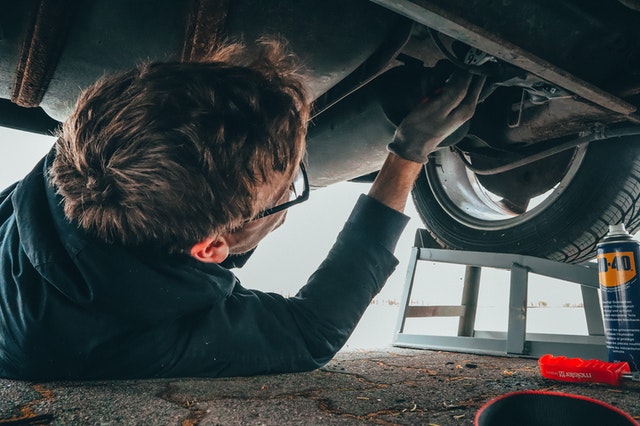It doesn’t matter if you’re a car fanatic or simply trying to get from point A to point B, buying your first car is always a huge accomplishment. If you tend to fall on the less mechanically-savvy side of the ledger, though, owning a vehicle can also be an intimidating prospect.
Sure, haggling over prices, applying for loans, and signing papers may all be in the rearview mirror. But what do you need to do to keep your nifty new ride upright and working smoothly? For car owners who know little-to-nothing about the vehicles they’re driving, it’s important to keep this list of tips and reminders in mind while on or off the road.
Start With Safety
There are roughly six million car accidents every year in the United States alone. Additionally, over a million people around the world die from traffic accidents on an annual basis. Needless to say, you’re taking a risk every time you drive your car. That’s why it’s important to keep these safety tips in mind before getting behind the wheel.
1. Brush Up on Your Defensive Driving Knowledge
Defensive driving is the concept that, as the driver, you’re proactively driving in a way that protects both yourself and others on the road. Driving defensively means you’re watching out for things like:
- Aggressive behavior from other drivers.
- Unwise actions from pedestrians.
- Bad weather creating poor driving conditions.
- Road rage getting the best of you.
By practicing defensive driving, you take the safety of the road into your own hands as much as possible.
2. Review What to Do in an Emergency
Even if you drive safely, you’ll likely have issues from time to time. When this happens, it’s important to know how to safely handle an emergency. A few suggestions that apply to most circumstances include:
- Keeping emergency essential items in your car like a cell phone charger, water, a flashlight, and a first aid kit.
- Getting your car off the road and calling for help as quickly as possible.
- Staying with your vehicle until help arrives.
- Refraining from fixing your vehicle while it’s on the side of the road.
Knowing what to do during an emergency is a key safety precaution. Along with these precautions, car safety should also encompass maintenance to keep you and your car all in one piece.
Maintain the Vehicle
Car maintenance doesn’t typically refer to big fixes or larger DIY projects. However, there are several maintenance items that you should regularly address on your vehicle, whether you or a mechanic does it themselves.
3. Change the Oil
Oil changes need to take place every few miles. Some cars make this process easy while others require a trip to the mechanic. Either way, make sure to keep an eye on the odometer so that you know when you need fresh oil.
4. Replace the Brakes and Rotors
Brakes and rotors wear down over time. When they do, they must be replaced as part of your maintenance activities. Your mechanic can help you understand when your brakes are low enough to be a safety hazard.
5. Rotate and Replace the Tires
Tires are another item that wears out over time. Initially, all you need to do is pay a few bucks to have your tires rotated (typically the front and back tires wear out at different rates). Once the tread gets low enough on all four tires, though, you’ll need to replace them.
6. Check the Fluids and Test the Lights
It’s important to observe the fluid levels in your engine. Things like coolant and transmission fluid must be kept at certain levels. Even if you don’t have the confidence to do this yourself, it’s important to have your mechanic check your fluid levels regularly.
7. Replace Your Windshield Wipers
Windshield wipers break over time. If you find that your wipers are getting streaky, replace them. Most auto store employees will even put the new ones on for you.
8. Keep an Eye Out for Recalls
It’s also wise to keep a close eye out on the news and your incoming mail for any recalls that may take place. If that happens, you may need to get the problem fixed immediately. If you suspect that your car is defective but a recall hasn’t been made yet, you’re going to want to report that, as well.
Don’t Forget Your Finances
Finally, it’s important to put your finances in order, too. Here are a few car-specific finance tips to keep in mind.
9. Set Up Recurring Payments
Recurring payments make it easy to ensure that you never miss your auto loan payment. This can help you avoid late fees and added interest.
10. Add Your Car Expenses Into Your Budget
Once you have your car, it’s important to add the expenses to your budget. This doesn’t just include your payment. Also, remember to factor in fuel and maintenance costs as well.
Keeping Up on Your Car
There are plenty of responsibilities that come with owning a car. Fortunately, if you take the time to list them out, it doesn’t have to be overwhelming. So sit down and address your car’s safety, schedule out its maintenance, and factor its costs into your budget. If you can do these things, you’ll be able to keep your car in good working order and avoid some costly repairs while you’re at it.
Author Bio
Ainsley Lawrence is a freelance writer that lives in the Northwest region of the United States. She has a particular interest in covering topics related to good health, balanced life, and better living through technology. When not writing, her free time is spent reading and researching to learn more about her cultural and environmental surroundings. Find her on Twitter.
